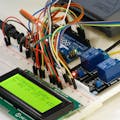In this tutorial we will learn how to make a simple Menu with buttons using Arduino and the I2C LCD.
Watch the Video!
Step 1: What You Will Need
- LCD Display I2C 20X4 (if you use diferent LCD then make sure that you specify the right Columns and Rows in the Visuino component)
- 2X Buttons
- Jumper wires
- Breadboard
- Arduino UNO or any other board
- Visuino software: Download here
Step 2: Circuit
- Connect LCD Display pin VCC to Arduino pin 5V
- Connect LCD Display Module pin GND to Arduino pin GND
- Connect LCD Display pin SCL to Arduino pin SCL
- Connect LCD Display pin SDA to Arduino pin SDA
- Connect Button1 pin VCC to Arduino pin 5V
- Connect Button1 pin GND to Arduino pin GND
- Connect Button1 pin Out to Arduino digital pin 7
- Connect Button2 pin VCC to Arduino pin 5V
- Connect Button2 pin GND to Arduino pin GND
- Connect Button2 pin Out to Arduino digital pin 8
Step 3: Start Visuino, and Select the Arduino UNO Board Type
The Visuino: https://www.visuino.eu also needs to be installed. Download Free version or register for a Free Trial.
Start Visuino as shown in the first picture Click on the "Tools" button on the Arduino component (Picture 1) in Visuino When the dialog appears, select "Arduino UNO" as shown on Picture 2
Step 4: In Visuino Add Components
- Add 2X "Detect Edge" component
- Add "Up/Down Counter" component
- Add "Clock Multi Source" component
- Add 5X "Text Value" component
- Add "Liquid Crystal Display (LCD) - I2C" component
Step 5: In Visuino Set Components
- Select "UpDownCounter1" and in the properties set Max > Value to 3 and Min > Value to 0
- Select "ClockMultiSource1" and in the properties window set Output Pins to 6
- Select "TextValue1" and in the properties window set Value to ">"
- Select "TextValue2" and in the properties window set Value to "ROW1"
- Select "TextValue3" and in the properties window set Value to "ROW2"
- Select "TextValue4" and in the properties window set Value to "ROW3"
- Select "TextValue5" and in the properties window set Value to "ROW4"
- Select "LiquidCrystalDisplay1" and in the properties window set Columns to 20 and Rows to 4
Double click on the "LiquidCrystalDisplay1" and in the Elements window:Drag "Text Field" to the left side and in the properties window set "Column" to 1 and "Initial Value" to "ROW1"
- Drag another "Text Field" to the left side and in the properties window set "Column" to 1 and "Initial Value" to "ROW2" and "Row" to 1
- Drag another "Text Field" to the left side and in the properties window set "Column" to 1 and "Initial Value" to "ROW3" and "Row" to 2
- Drag another "Text Field" to the left side and in the properties window set "Column" to 1 and "Initial Value" to "ROW4" and "Row" to 3
- Drag another "Text Field" to the left side and in the properties window set "Column" to 0 and "Initial Value" to ">" and "Width" to 1, Select "Row" and Click on the pin Icon and select "Cardinal SinkPin"
Close the Elements window
Step 6: In Visuino Connect Components
- Connect Arduino Digital Pin [7] to DetectEdge1 pin [In]
- Connect Arduino Digital Pin [8] to DetectEdge2 pin [In]
- Connect DetectEdge1 pin [Out] to UpDownCounter1 pin [Up]
- Connect DetectEdge2 pin [Out] to UpDownCounter1 pin [Down]
- Connect UpDownCounter1 pin [Out] to LiquidCrystalDisplay1 > Text Field5 pin [Row]
- Connect UpDownCounter1 pin [Out] to ClockMultiSource1 pin [In]
- Connect ClockMultiSource1 pin [0] to LiquidCrystalDisplay1 pin [Clear]
- Connect ClockMultiSource1 pin [1] to TextValue1 pin [Clock]
- Connect ClockMultiSource1 pin [2] to TextValue2 pin [Clock]
- Connect ClockMultiSource1 pin [3] to TextValue3 pin [Clock]
- Connect ClockMultiSource1 pin [4] to TextValue4 pin [Clock]
- Connect ClockMultiSource1 pin [5] to TextValue5 pin [Clock]
- Connect TextValue2 pin [Out] to LiquidCrystalDisplay1 > Text Field1 pin [In]
- Connect TextValue3 pin [Out] to LiquidCrystalDisplay1 > Text Field2 pin [In]
- Connect TextValue4 pin [Out] to LiquidCrystalDisplay1 > Text Field3 pin [In]
- Connect TextValue5 pin [Out] to LiquidCrystalDisplay1 > Text Field4 pin [In]
- Connect "LiquidCrystalDisplay1" pin I2C [Out] to Arduino pin I2C [In]
Step 7: Generate, Compile, and Upload the Code
In Visuino, at the bottom click on the "Build" Tab, make sure the correct port is selected, then click on the "Compile/Build and Upload" button.
Step 8: Play
If you power the Arduino module and by pressing the buttons you will be able to change the menu selection on the LCD.
Congratulations! You have completed your project with Visuino. Also attached is the Visuino project, that I created for this tutorial, you can download it and open it in Visuino: https://www.visuino.eu





_ztBMuBhMHo.jpg?auto=compress%2Cformat&w=48&h=48&fit=fill&bg=ffffff)















Comments
Please log in or sign up to comment.